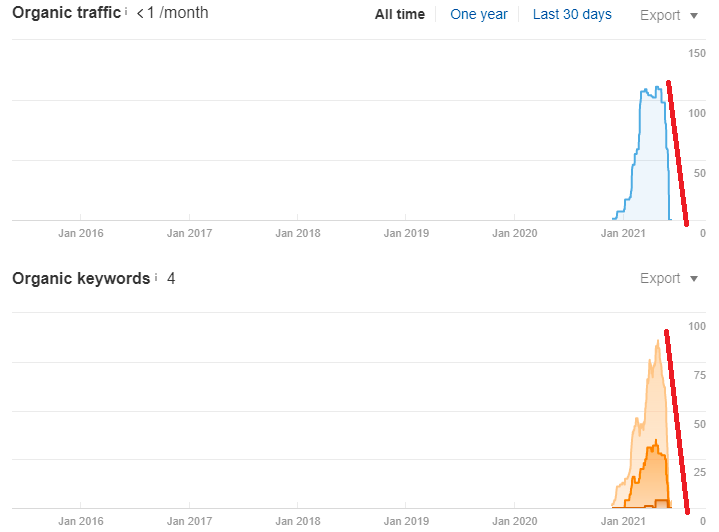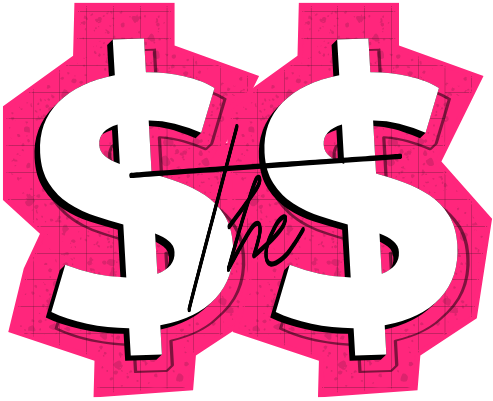One week ago, in my weekly newsletter, I shared that I've lost rankings to one of the leading money pages on my niche website project. Well, it turned out that it was even worse.
As I thought that I'd lost only the position of my top ranking keyword, I've actually lost all 90+ keywords, as suddenly, that article was no longer on Google's index.
Let me walk you through the whole process, from how I found out to what I did to recover the lost position in under 12 hours.
Also, I noted my weak spots through the whole process of building this website, and I am putting together a system for detecting potential mistakes in the future.
How I Noticed That My Post Link Was No Longer on Google's Index?
As I've reported in the last email, one of my top-performing articles lost its primary, high-volume keyword position.
And couldn't settle why did it happen. I ran the article through Ahrefs to see what's the situation and it was bad.
Like bad enough.

Lost SEO Keywords in a heartbeat
If you see a sudden traffic drop to one of your top-performing articles, for example, from 1000 page views per month to zero, then this should ring the fire bell that something isn't right.
I checked Google Analytics and what I saw confirmed what Ahrefs was displaying.
Then, I checked my Google Search Console (GSC) to see if there was any problem with the sitemap, manual penalty, pages with red "Core Web Vitals," but much to my surprise none of them was present.
Then, I thought, let me inspect the URL in GSC to see if anything else will come up. And then I saw this window "URL is not on Google."
(At this point I am playing "Sh*t, Damn, Motherf*cker" by the one and only D'Angelo.)

Google says that the URL I am inspecting is not on Google's Index. My heartbeat stopped.
To this day, I've never had such a problem before, and I don't know what may have caused the issue.
The article didn't have any external links, only relevant, not overly optimized internal links.
However, analyzing the SERPs with the top 10 results for this particular keyword gave me some clues.
With a domain rating of 1, my website was ranking #4, among domains with a domain rating of 50-60-70.
What could this possibly mean?
My interpretation is that my website lacks the authority of the other nine websites on Google's front page, so my article doesn't deserve the spot.
My article was ranking #4 for months, and because I had no coming external links to it, I think Google saw it as a sign that it wasn't good enough.
If an article is on the first page and people don't want to link to it, maybe it's not good enough, and Google must give that opportunity to another article.
I said, fair enough. Let me see how I can prove myself wrong or right.
The Process of Evaluating the Top 10 Results and Making Changes
I've created one Google spreadsheet to evaluate all the top 10 results. It's a process I developed within 5 minutes.
The goal was to detect what my article was missing - what the other articles had and what my article lacked.
One - two hours into the task, and I completed the process. I added additional content, which my rivals had, but my article didn't.
And I wrote the content myself; I didn't outsource the task. I added particular sentences, tables, comparison charts, and every type of content the top 10 results had, but my article didn't have.
Two more hours passed until I entirely updated the article with more content and rich content formats.
The article already had many internal links from relevant articles. I've evaluated the anchor text used, but they were all fine.
Then one thing left. I've noticed that all articles on the front page had at least one do-follow backlink to them.
Luckily, I still have other niche websites up and running. One of them is built on an expired domain and has a pretty strong DR.
The website is in the sports niche and it had an article relevant to this niche project website. I added the link, and then I've requested new indexing for that post in GSC.
I then tested the live URL in GSC to see if Google can crawl it and fetch the content (this is the article I am updating). Everything was fine. I then requested indexing.

These are the two steps to take in Google Search Console to recover lost SEO Keywords.
And waited. There is no need to request indexing multiple times; once is enough. Thirty minutes later, I inspected the URL in GSC, and voila. It was already in Google's Index.
I guess that Google is getting super fast in index requests. They want more (good) content on Google because this is how they make their billions.

Approximately 30 minutes later, the URL is on Google's Index.
12 Hours Later
The following day I checked the URL on Ahrefs. Two things happened:
- The article has already gained the backlink from the website I built it.
- The article was already ranking #4 for the main keyword I've lost, for a total of 4 keywords. I guess ranking for 100 keywords under 12 hours will be too much to ask for. 🙂 Reclaiming #4 spot back was already a hell of a miracle.
Five Days Later
Five days later, after the recovery, the article is gaining traction in terms of more keywords and traffic.
What Can I Do to Detect such Problems in Advance?
I've thought a lot about it.
This website already has 170 articles published, and I think somewhere in the rush to upload as much content as I can, I've made the mistake to neglect the good content and missed the opportunity to turn it into great content.
I will change the number of articles I upload each day and start improving and optimizing existing content.
Also, I will do monthly checks, comparing the number of articles on my website to the number of articles indexed by Google (thank you, Thomas, for this tip).
Further, I am introducing a new system for analyzing competitors' articles before I write mine. This includes new guidelines for my writers.
The content for each article will follow a particular structure, depending on my analysis for each keyword. This process will be applied to the way I update existing content.
To keep your top-performing-money pages on top, you need to improve them through incremental experiments and changes constantly.
There is no way to stay on top with the old "upload and publish" approach. I am observing how bloggers and publishers are coming with some new, better ways for content creation.
They include more tables, more data, more research, more visualizations to make it easier for the reader to digest the content.
This is the feedback loop we all need in life to be better in anything and everything.




